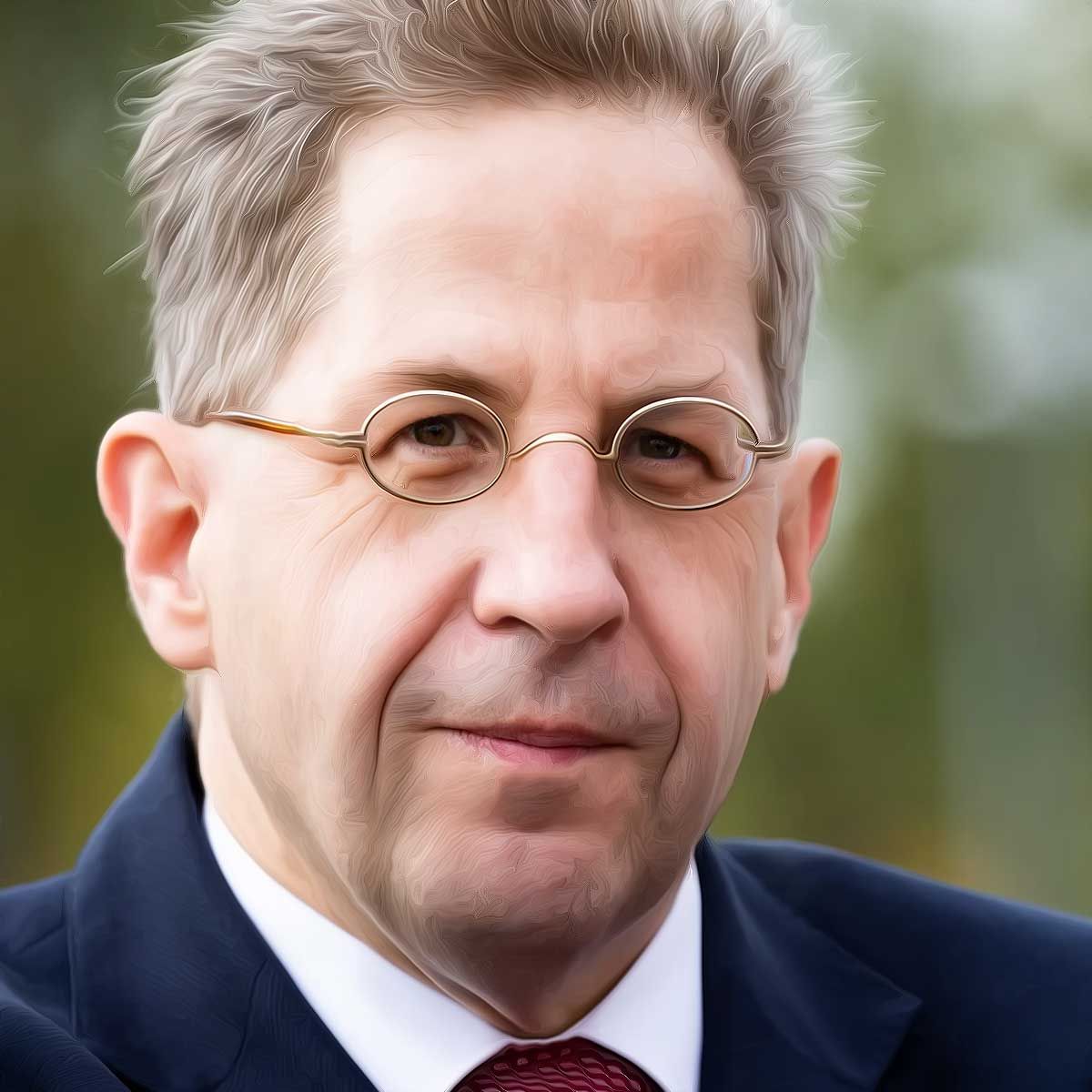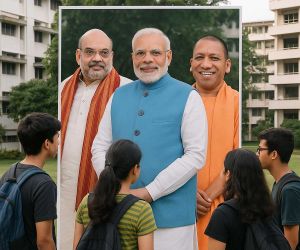MORE COVERAGE
Twitter Coverage
Satyaagrah
Written on
Satyaagrah
Written on
Satyaagrah
Written on
Satyaagrah
Written on
Satyaagrah
Written on
JOIN SATYAAGRAH SOCIAL MEDIA
"Europeans will succumb to Islam": Former top German spy Hans-Georg Maaßen exposes an anti-German agenda, unveiling a disturbing prophecy of Muslim majority in Europe by 2200, raising questions about democracy and cultural transformation

In a recent interview, Hans-Georg Maaßen, Germany's former top domestic spy chief, issued a stark warning about the challenges Europe faces due to mass immigration. Maaßen believes that an unprecedented crisis looms, emphasizing the cultural differences brought by immigration and suggesting that Europe, particularly Germany and Austria, must take decisive action to avert potential consequences.
Maaßen expressed deep concern about the clash of cultures unfolding in Europe, asserting that the continent is ill-equipped to handle the challenges posed by mass migration. He pointedly remarked, "A completely different culture is approaching us. We are not at all prepared for this, as we're incapable of resolving conflicts even by means of violence, like family clans do from the Arab states. These people resolve conflicts by violence, whereas people in Central Europe think that this can only be done through the courts."
His perspective sheds light on the contrasting approaches to conflict resolution between the incoming cultures and those already established in Central Europe. Maaßen implies that the cultural disparity extends beyond mere diversity and touches upon fundamental differences in addressing disputes, urging Europeans to acknowledge this reality for effective integration.
Maaßen's concern is not limited to cultural clashes alone; he also suggests that Islam is gaining a stronghold in Europe and could potentially "conquer" the continent. This provocative claim raises questions about the future identity of Europe and the challenges posed by the increasing influence of Islam in the region.
Despite these alarming observations, Maaßen contends that there are measures that Germany and Austria could undertake to mitigate the crisis.
Hans-Georg Maaßen's warning extends beyond the immediate challenges posed by mass immigration, delving into a broader concern for the future of European cultures. According to him, the inability to foresee the cultural conflicts emerging and the incapacity to resolve them effectively will lead to a gradual destruction of the rich tapestry of European societies.
Maaßen bluntly states, "The Europeans will succumb to Islam. On the one hand, because they are unable to even see this conflict coming, and on the other, because they are incapable of resolving conflicts in a similar fashion. The end result will be the gradual destruction of our European cultures." This foreboding assertion calls for a serious introspection into Europe's readiness to confront the challenges posed by cultural shifts and the potential consequences of not addressing them promptly.
The former spy chief goes on to describe a significant disparity between Europeans and other competing cultures. He highlights a lack of vision and mission among Europeans, contrasting it with cultures that have a clear sense of identity and purpose. "We don't know where we want to go. What should Germany or Austria look like in 2030? We are living only in the moment, and therefore we are losing out to others who have a religion or ideology, who know where they want to go. We lack a mission," Maaßen laments. This commentary underscores the importance of long-term planning and a collective sense of purpose for a society's well-being.
Maaßen draws attention to the contrasting awareness of culture, religion, and family between Europeans and Muslim migrants. According to him, secular Europe places less emphasis on religion and family, treating them as individual matters. In contrast, Muslim immigrants, view these aspects as communal concerns, deeply embedded in the fabric of their societies. This fundamental difference in perspective poses a challenge to effective integration and requires a nuanced approach to bridge the cultural gap.
Population Replacement by Design: Maaßen's deep Insights
Hans-Georg Maaßen's assertion that European politicians are actively promoting mass immigration for a specific demographic shift raises profound concerns about the motives behind such policies. According to Maaßen, this deliberate approach is driven by a desire for a "different population," suggesting a strategic effort to reshape the social fabric of European nations.
Maaßen contends, "Our politicians want a different population. The political left follows the course of the anti-German ideology. The more heterogeneous a population, the less able it is to articulate itself and have a democratic say. The more politics accepts immigrants from other countries as they see fit and grants them citizenship, the more politics selects the people of the state and influences the election results. These migrants then vote differently than the locals." This incisive commentary raises questions about the intersection of immigration policies, political ideologies, and the impact on the democratic process. It challenges the notion of a cohesive, representative democracy when demographic changes are actively manipulated for political gain.
|
The former spy chief contends that nations like Germany and Austria possess the means to halt immigration if they so choose. Maaßen points out a practical approach that could be implemented swiftly: "Germany and Austria could start rejecting people at the borders from one day to the next — due to the third country regulation. Furthermore, the state could deport or ensure voluntary departure for hundreds of thousands of foreigners who do not want to integrate and who could commit crimes and continue to depend on social benefits from the state." This statement underscores the power and agency these nations hold in shaping their demographic landscape, presenting a stark choice between actively shaping the population or succumbing to a predetermined narrative.
Addressing a major challenge faced by Western governments in the deportation process, Hans-Georg Maaßen outlines potential strategies for dealing with nations unwilling to take back their citizens. Maaßen acknowledges the reluctance of some third nations but asserts that there are viable tools to compel cooperation. He suggests, "It should also be possible to persuade third countries to take back their own nationals after deportation orders. If they don’t do it, you could ‘freeze their assets,’ prevent (their citizens) from traveling to Europe and other things. You have to persuade these states to behave in accordance with international law." This pragmatic approach proposes a combination of diplomatic and economic measures to ensure compliance, emphasizing the need for nations to uphold their responsibilities under international law.
|
The former spy chief's recommendation to 'freeze assets' and restrict travel serves as a leverage point, intending to incentivize third nations to adhere to international norms. By employing economic consequences and restrictions on mobility, Maaßen suggests a comprehensive strategy that could influence recalcitrant states to cooperate in the repatriation of their nationals. This proposal introduces a diplomatic dimension to the immigration debate, emphasizing the interconnectedness of global relations in addressing the challenges posed by mass migration.
Despite these potential tools at their disposal, Maaßen expresses doubt about the willingness of Germany's politicians to take substantial measures against illegal immigration. He states, "Maaßen doubts that Germany’s politicians are planning to take any serious measures against illegal immigration despite the growing risks, especially from violent cultures." This skepticism raises critical questions about the political will and commitment to address the pressing issues associated with illegal immigration. It underscores the urgency for policymakers to confront the rising risks and complexities posed by cultural differences and potential security threats.
|
Hans-Georg Maaßen poses a fundamental query that lies at the heart of the immigration debate: "Why aren’t migrants simply turned back at the borders?" This straightforward question challenges the current narrative surrounding migration policies and advocates for a reassessment of the entry points into European nations. Maaßen's critique extends beyond the surface-level discussions seen at recent migration summits, which he characterizes as "showcase politics" or "dummy politics." In his view, these events often prioritize financial considerations and expedited asylum procedures while sidestepping the pivotal question of the rationale behind admitting migrants into Germany and Europe.
Maaßen draws attention to a glaring omission in the discourse by emphasizing, "Why do we let these people into Germany and Europe in the first place?" This inquiry demands a deeper examination of the motivations and objectives behind current immigration practices. It encourages policymakers and the public to scrutinize the underlying principles guiding decisions related to border control and migrant admission.
The former spy chief points to the need for better enforcement of European treaties, particularly in countries like Italy and Greece, where he advocates for more robust border protection measures. He questions the allocation of significant resources to accommodate migrants while neglecting the welfare of locals facing economic hardships, such as impoverished pensioners. Maaßen raises a poignant concern, "Why don’t we force countries like Italy and Greece to finally do what they are supposed to do according to the European treaties, namely sensible border protection? Why do we let these people come to us, feed them and spend billions on them, while many locals, poor pensioners with a 920 euro pension after a full working life, have to collect bottles?" This stark juxtaposition highlights the societal disparities and prompts reflection on the ethical dimensions of current immigration policies.
|
Muslim majority by 2200?
Hans-Georg Maaßen's concerns about the impact of mass migration on Germany's senior population find resonance in existing realities. As previously reported by Remix News, millions of German seniors are grappling with poverty, and disturbingly, some are being displaced from their homes to accommodate the surging influx of migrants into the country. This alarming scenario points to the tangible consequences of demographic changes, raising questions about the societal responsibility to ensure the well-being of vulnerable segments amidst evolving population dynamics.
The issue at hand becomes even more pressing when considering the broader demographic predictions for Europe. Maaßen's warnings may indeed be prescient, as Europe experiences rapid demographic change. Pew Research has conducted a comprehensive study, indicating that Europe's Muslim population could triple by 2050, reaching 76 million. This projection underscores the significance of addressing the challenges posed by cultural integration, conflict resolution, and the potential strain on social and economic systems as Europe undergoes a significant demographic transformation in the coming decades.
Looking further into the future, PSU Research Review predicts a Muslim majority in Europe by 2200. This extended timeline introduces a contemplative perspective on the long-term implications of current migration patterns. It prompts a reflection on the cultural landscape, social dynamics, and political structures that may evolve over the centuries, emphasizing the need for proactive measures to navigate these changes thoughtfully and responsibly.
|
In specific EU countries, including Greece, Ireland, France, Belgium, and Britain, projections indicate that more than three-quarters of the population could be Muslim. This localized forecast raises pertinent questions about the unique challenges and opportunities each nation may face, urging policymakers to tailor their strategies to the distinct socio-cultural contexts within their borders.
As we conclude this exploration of Maaßen's warnings and the demographic forecasts for Europe, it is imperative to recognize the complexity of the issues at play. The article calls for a nuanced, informed, and compassionate approach to address the multifaceted challenges associated with mass migration and its far-reaching consequences on European societies.
 Support Us
Support Us
Satyagraha was born from the heart of our land, with an undying aim to unveil the true essence of Bharat. It seeks to illuminate the hidden tales of our valiant freedom fighters and the rich chronicles that haven't yet sung their complete melody in the mainstream.
While platforms like NDTV and 'The Wire' effortlessly garner funds under the banner of safeguarding democracy, we at Satyagraha walk a different path. Our strength and resonance come from you. In this journey to weave a stronger Bharat, every little contribution amplifies our voice. Let's come together, contribute as you can, and champion the true spirit of our nation.
 |  |  |
| ICICI Bank of Satyaagrah | Razorpay Bank of Satyaagrah | PayPal Bank of Satyaagrah - For International Payments |
If all above doesn't work, then try the LINK below:
Please share the article on other platforms
DISCLAIMER: The author is solely responsible for the views expressed in this article. The author carries the responsibility for citing and/or licensing of images utilized within the text. The website also frequently uses non-commercial images for representational purposes only in line with the article. We are not responsible for the authenticity of such images. If some images have a copyright issue, we request the person/entity to contact us at This email address is being protected from spambots. You need JavaScript enabled to view it. and we will take the necessary actions to resolve the issue.
Related Articles
- To protest against street Namaz, politicians and Mayor of a suburb sang the national anthem: France
- Amid an unprecedented migrant influx, Elon Musk warns of New York City 'buckling under the load', Mayor Adams declares a humanitarian crisis, urging the Biden administration for aid as shelters near capacity and costs spiral to a staggering $12 billion
- "गुस्ताख़ बे अदब": Oops! The City Council of Cologne succumbs to the pressure of Turkish Muslim migrants; Goodbye, Armenian Genocide memorial; Welcome, new dance routine – the 'Diversity Waltz,' while History takes a backseat in this cultural shuffle!
- 'Armed jihad...': France shuts Allonnes mosque and Islamic school for harbouring 'radical Islam', plans to close 7 more
- "वालेकुम अस्सलाम": A Saudi doctor, Taleb Al-Abdulmohsen, drove into Magdeburg's Christmas market, killing 2, injuring 60, raising security concerns as 92.1% of crime hikes in Lower Saxony were linked to migrants under Merkel’s open-border policy
- "I was upset… you know": Islamist Miyandoab shouting ‘Allahu Akbar’ kills 1, injures 2 others in a knife attack near Eiffel Tower, had spent 4 years in prison earlier for planning a violent attack, was under surveillance and receiving psychiatric therapy
- 'Have more children and that is how we grab power' says AIMIM leader while inciting Muslims: Viral video
- Islamists, journalists and ‘liberal-secular’ intellectuals indulge in making ‘Hinduphobic’ remarks and mocking Hindu deities in an attempt to discredit the discovery of Shivling inside Gyanvapi masjid in Varanasi
- In yet another horrific incident of grooming jihad Mohammad Yasin, a supplier of ayurvedic medicine killed his second wife ‘Zara’ earlier a Hindu girl 'Shiva Vishwakarma': Left their three-year-old girl child outside the house
- "बम्बू कथा": Ata ur Rehman arrested for molesting a woman and issuing death threats; seen limping with police support upon release; concurrently, in Muzaffarnagar, Salman, after following a woman with acid, is also arrested only to coming out limping
- "मौसम बिगड़ने वाला है": A violent mob attack during an eviction drive in Guwahati, left multiple cops injured, two attackers Haider Ali & Juwahid Ali killed in police firing; situation remains tense as authorities deploy additional forces to restore order
- "कल्कि": Sambhal, the prophesied birthplace of Kalki Avatar, saw Harihar Mandir fall between Balban’s 1254 massacre and Sikandar Lodhi’s rule, as Carlleyle’s 1879 ASI report exposed temple remains beneath Shahi Jama Masjid, rewriting history
- Old clip where SRK said he’d be okay with his son doing drugs makes round after Aryan Khan detained in drugs party case
- Twitter rewards an Islamist org, set to be banned by India, with a verified blue tick: Here is what PFI has done in the past
- Ali Siddiqui, posing as 'Monu Yadav', orchestrates a 'Love Jihad' in UP, leading to the assault of a minor, this chilling case exposes the perils of digital deceit, and the critical role of POCSO & law enforcement in shielding young from such treachery

























